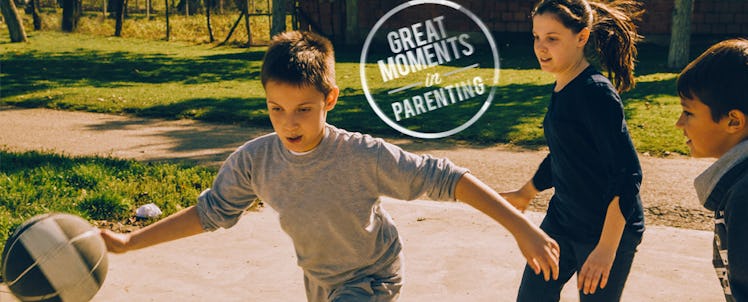When I Realized My Son Would Be a Good Man
He chose to sacrifice something he loved because of his belief in fairness. I couldn't be more proud.

Welcome to Great Moments in Parenting, a series in which fathers explain a parenting hurdle they faced and the unique way they overcame it. Here, Andrew, a 50-year-old dad from Colorado explains the moment he learned that his son had been fighting playground bullies for weeks without telling him — and realizing that his only child did not, in fact, have only-child-syndrome.
My son is pretty good at sports. He used to play basketball with a group of boys in first and second grade. At some point, a couple of the boys he played with decided that no girls should be allowed to play, and only the “best players” could play. My son was lucky enough to be chosen as one of the four best players, but the whole thing bothered him to the point where he stopped playing. In the second grade, he tried to get back on the court and it was the same kind of thing.
At some point, he started to argue about this and say, “You can’t do this, it’s not your property, it’s the school’s property, anybody should be allowed to use it.” That made me very proud because I wasn’t there to tell him to say that. I didn’t even know about it until much later.
He didn’t just stop at the argument being over. There was one boy who, in the second grade, could probably beat every second grader in the district, and my son was very good friends with him, so he actually kind of politicked with him. He say, “Hey, this isn’t right. They shouldn’t be doing this.” He got that boy to walk away from the basketball game, which made the other players go, “Okay, okay okay, we’ll change it. Girls can play.”
But that didn’t hold. He went to get help from adults. As you can imagine, it’s hard for a teacher’s assistant to watch a whole playground, so the TA would come over and reset the rules, but then the next day it would be not so good. Finally, he came and talked to us.
Which I give him credit for. He didn’t want us to get involved at first. And even when he finally came to talk to us, he didn’t want us to do anything. I let it go for a week or so before finally getting in touch with the principal because I felt the whole situation was ridiculous. The kids can’t say girls can’t be involved in something. The principal went out at recess and spoke to the boys.
When I picked my son up at the bus stop that day, I asked if anything happened. My son said, “Yes, you know. They finally saw the way that I was talking about it.” I asked, “Did anyone else get involved?” He said no. And at the end of the night, I couldn’t take it and I was like, “Are you sure the principal didn’t come out?” And he said “You know, it was a coincidence, but he came by, too.”
I don’t know if my son is telling himself the story that he resolved it himself or not. But that’s not really the point. I just feel like, you don’t know if your kids are understanding that “right” or “wrong” goes beyond their own self-interests. And in this case, it did, even though ultimately he didn’t win the playground battle. The boys started being exclusionary again. So he stopped playing and did other things.
He sacrificed something he really liked doing, but he found other things he liked doing. And he sacrificed it because it wasn’t right. I think it became less fun for him because of that.
My son is Gifted and Talented and a good athlete. When we went to parent-teacher conferences this year, that wasn’t what the teacher talked to us about. She talked to us about his leadership. She wants him to strive more in leadership opportunities. I think that after a couple of years on the playground, even though he lost the battle, he learned some things about right and wrong. About doing the right thing, and being a leader. And his teachers have noticed that, too.
Our son is an only child. I was very afraid that he might suffer from “I get what I want,” because he didn’t have to fight brothers and sisters for everything like I had to. At the same time, we didn’t want to introduce him to “the world’s not fair” in a mean way.
This was a lesson in “the world’s not fair, and you don’t always get what you want,” though. And he still did the right thing. He was thinking of those things that matter more to people. He didn’t want to the boys and girls who weren’t allowed to play basketball to feel like they were worse.